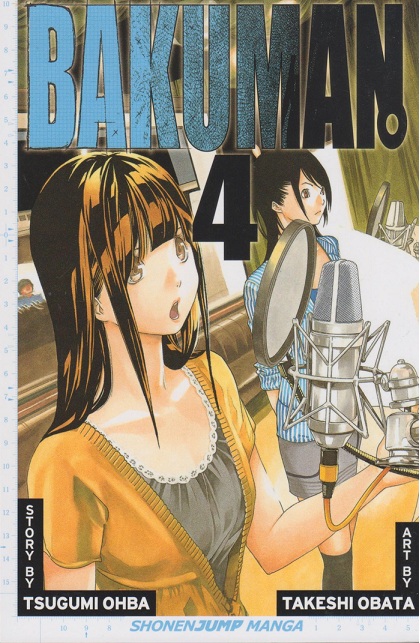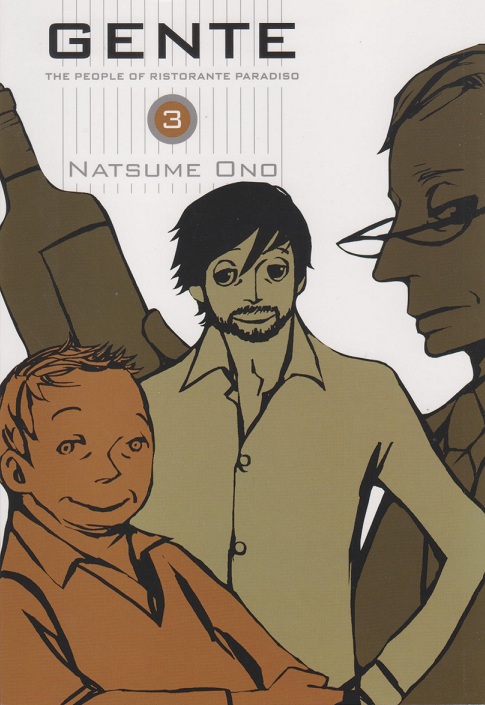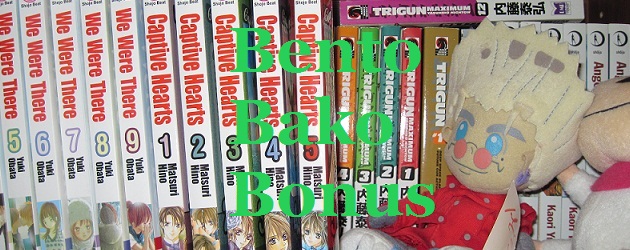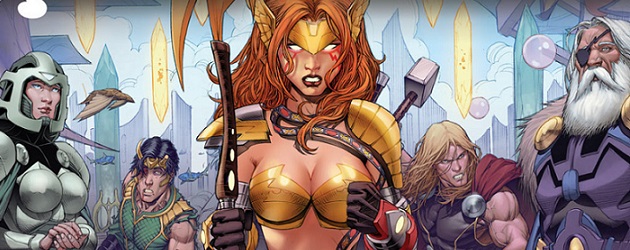 Title: Bakuman
Title: Bakuman
Author: Tsugumi Ohba, with art by Takeshi Obata
Publisher: Viz Media (Shonen Jump)
Volume: Volume 4 (ongoing), $9.99
Vintage: 2009 by Shueisha, April 2011 by Viz Media
Genre: Slice-of-life, comedy
Previously, Mashiro and Takagi split up for the summer to separately develop ideas for a battle manga. Though they were both stumped for ideas on that front, remarkably the each came up with some ideas for a detective manga. When they finally meet up at the end of summer, Takagi confesses that he doesn’t have the storyboards for a battle manga ready and turns over the key to their shared studio. Separately, the boys talk with their editor, Hattori, who realizes that both writer and artist are miraculously somehow on the same wavelength, even though they have not shared their ideas with each other. Hattori encourages them both to continue with their ideas for a detective manga, realizing the potential for such a series, and decides to use a little manipulation to get them back on track. The two boys struggle on their own for a while, until Takagi decides to tell Mashiro everything. When they realize how incredibly in synch they are with each other, they immediately get back together to work on the detective story, but decide not to tell Hattori until they’re ready. Hattori was trying to make sure the boys carefully thought out their series and prepare it for a pitch after two years, but both Mashiro and Takagi want a series before then, so they work hard on storyboards to prove to Hattori that they’re ready for a series now. To help Takagi prepare to write a detective series, Hattori had sent him boxes of DVDs and books to study as part of his two year plan for the pair. However, since they want to get something ready in six months time, Takagi won’t really have time to look over all the material. Realizing that her man needs help, Miyoshi announces that she is going to abandon her dream as a cell phone novel writer, and work to help make Takagi’s dream come true instead (forehead, meet palm) by going over the materials and writing summaries for him. Once they finally do show their work to Hattori, he is impressed by their passion and hard work and decides to give them a chance. He sets up a grueling schedule for them so he can test their abilities, and also so that he will later be able to prove to the chief editor that Takagi and Mashiro are ready and capable to create a series while they are still in high school. He arranges for the pair to enter the Gold Future Cup contest, where they will compete alongside Mashiro’s friends Fukuda and Nakai (whom he worked at Eiji Nizuma’s studio), and a rock star who wants to try his hand at creating manga. The competition is fierce, and the winner will likely be able to turn their story into a new series. While Takagi and Mashiro are working hard on their Gold Future Cup entry and creating storyboards for a possible series, Miho is dealing with a slight setback to her acting career. Though the show she is in is doing well, Miho is told that the only reason she’s had any success is because of her looks, and her manager (I think) is trying to get her to do a photobook. Uncomfortable with the idea, Miho wants to refuse, but her manager assures her that here career will go nowhere if she does not accept the offer.
Oh, Bakuman. Are you some bizarre self parody? Do you hate women? I just don’t get you. The females in this series (what few there are) only serve to propel the males forward. Miho is the driving force behind Mashiro’s desire to create a manga that will lead to an anime series (if you’ll recall, their deal is basically that Mashiro will make an anime for Miho to voice act in, then they’ll get married). And now Miyoshi has decided her purpose in life is to support Takagi’s dream. It’s nice she wants to support him, but why should she give up on her own dreams for that? Though, admittedly, her dream of writing cell phone novels was rather silly, and Takagi was really doing all the work anyway. The only positive thing I can say on this front is that Miho doesn’t want to go peeling off her clothing for her career, so good on her. Now, let’s talk about the Gold Future Cup. This is going to spoil things a bit, so beware. I understand that Takagi and Mashiro are the main characters, so it would be kind of dumb for them to lose their “battle,” but Nakai has been working his ass off for so long, and he’s close to giving up his dream because he can’t catch a break. I feel sorry for him, that he’s been working for his whole life toward his goal, and some punk kids wake up one day wanting to create manga, and waltz in and suddenly leap ahead of him. I would be hugely frustrated if I were him. He does catch a small break here, but I feel like it’s pointless, because Takagi and Mashiro, as the main characters, are the ones with the best chance of success. On the industry side of things this volume, Bakuman gives us an inside look at how a company chooses what new series it will launch, and explores the motivations of some manga editors. Specifically, Hattori, who wants to cultivate Takagi and Mashiro and see them succeed more than anything; and Yujiro, who wants his creators to succeed so that he can be promoted.
 Title: Gente: The People of Ristorante Paradiso
Title: Gente: The People of Ristorante Paradiso
Author: Natsume Ono
Publisher: Viz Media (Viz Signature)
Volume: Volume 3 (final volume), $12.99
Vintage: 2009 by Ohta Publishing Company, May 2011 by Viz Media
Genre: Slice-of-life
The final volume of Gente is sadly upon us. It starts out with a story about politicians, centered on Senator Verdiani, whose granddaughter likes to tell him his fortune every morning before he leaves for work. Because one of her fortunes came true, he has always followed her instructions since, usually with positive results. Things aren’t looking good for his political party, so when his granddaughter predicts a “day of decision,” he’s on his guard, until a visit to Casetta dell’Oroso clears everything up. Next, notorious womanizer Signore Rizzo constantly cheats on his wife (though she does the same). This time, he’s found himself drawn to a Casetta regular – Savina, who has had her eyes on the shy Luciano. Meanwhile, Olga’s daughter Nicoletta continues to try and get Claudio’s attention, with little success. Signore Rizzo tries to give her some love advice, even while his own quest to seduce Savina is failing utterly, to his consternation. The next story is a touching one. Well, it’s a little on the silly side as well, as Lorenzo is reaching an age where he needs to start wearing glasses, which he knows will make Olga absolutely ecstatic. While he puts off getting this sign of old age, he and Nicoletta contemplate their relationship as a father and daughter. The ridiculously adorable Gigi takes the spotlight in the final chapter, when he is invited by a small stranger to an interesting tea party while visiting his father’s grave. A gentle story which, along with the previous one focused on Lorenzo, highlights the value of family, even those not related by blood.
This final volume is largely unsatisfying. I don’t at all mean that in a strictly negative way. What I really mean is that I don’t want it to be over! I want more of these handsome, glasses wearing gentlemen! I am not satisfied. I feel like there’s plenty more story to tell. This is such a good volume, as well, so it’s even more frustrating that this is the final volume. Hm, maybe we can convince Nozomi to license the anime? It won’t really add more story, but it would make me feel better. As for this particular volume…. The first chapter on the politicians is a little difficult to read; I assume because I’m unfamiliar with how Italy’s government operates, because most of the dialog doesn’t make any since. The political stuff is relatively unimportant, though, as the main thrust of the story is the humorous way the granddaughter’s fortunes play out. The story about Rizzo pursuing Savina is humorous in its way, but its message of lasting love is an interesting one. Or, specifically, how love can change between people over time. One of the main things I was disappointed by, was that nothing plays out between Nicoletta and Claudio, even though the others at the restaurant try to badger her into taking some action already. (Though, maybe this story line wrapped up somehow in Ristorante Paradiso; it’s been a while since I’ve read that one, and unfortunately I don’t own a copy of my own.) The focus on all the employees of Casetta dell’Oroso as a family is my favorite thing about the volume. They’re all very close to each other, and each member sort of takes on a certain position. Lorenzo is like everyone’s father, Luciano like everyone’s grandfather, Nicoletta like everyone’s daughter, etc. It creates a very warm, inviting atmosphere; I would love to dive into the world of this book.
Kris
kristin@comicattack.net
@girlg33k_Kris
Review copies provided by Viz Media.



Pingback: New license speculation from all over « MangaBlog
Pingback: Natsume Ono MMF Archive « Manga Widget